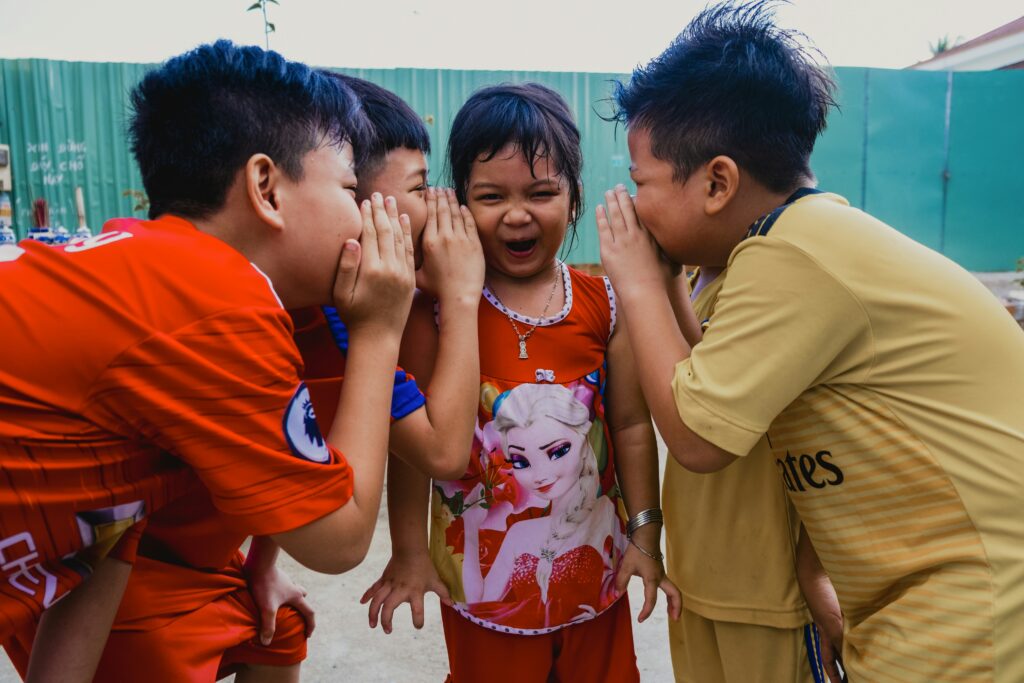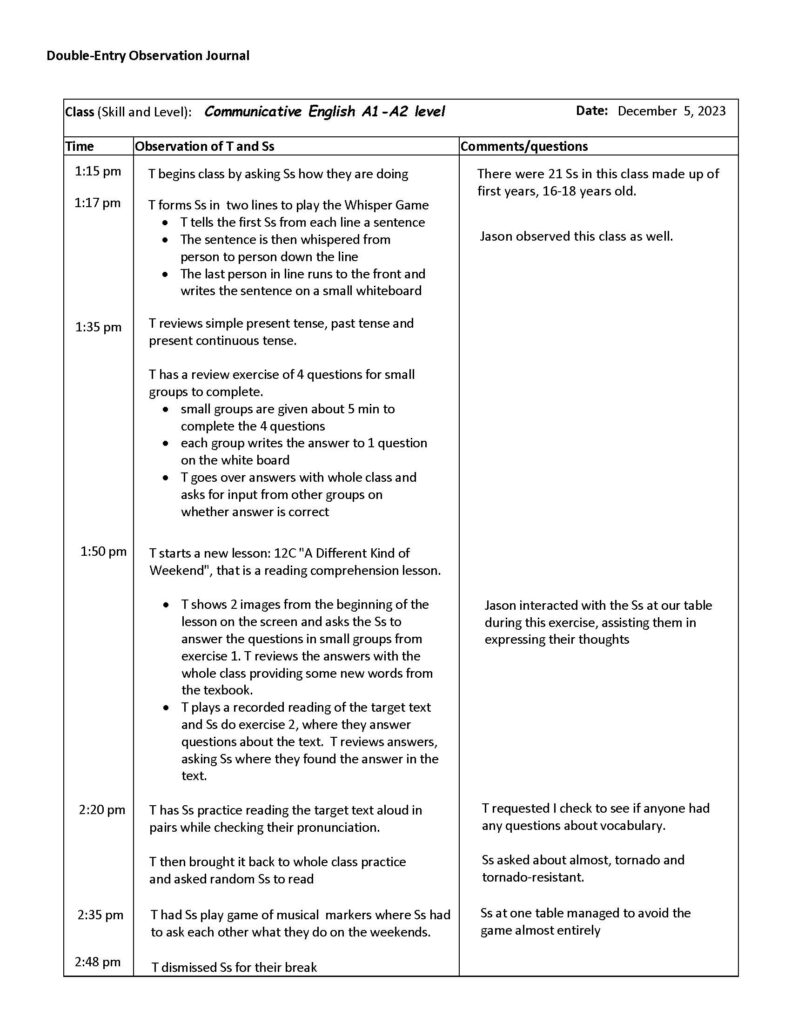

Reflection
The class began with about 15 Ss and the final 6 Ss trickled over the 15-20 min it took for the whisper game to be played. It seemed like it was a normal occurrence as no one commented or specifically greeted the newcomers. They just quickly and quietly put their bags down and joined in the activity.
While playing the game I noticed that in both lines the Ss strategically placed their best writers at the end of the line. I found it interesting that quite often, on both teams several members would lean together to hear the message and confer to ensure it was passed on correctly. I wondered if it was a cultural norm to work on problems as a group, so the idea of passing the message along 1 person at a time to see how much it changed wasn’t as important or funny in this context. There was some sense of competition, but very little, and the winners of the round and the game received polite applause.
What really excited me in this first class was noticing that Ms Van spoke quite quickly to the students, and that some of the instructions were given in English, and some in Vietnamese. I have been studying translanguaging, and believe that it would be beneficial, both linguistically and emotionally to Ss as they learn a second language. Linguistically it can allow them a chance to get a deeper understanding of a term by having it relayed in their own language, or they can get to instructions better if you can repeat them in both languages. Also, their is not the sense that you want them to stop thinking in their own language to learn a second, letting them dynamically construct their own sense of identity as a multilingual person with knowledge of two languages and two cultures. As I don’t speak Vietnamese, I might have new vocabulary translated for the Ss on worksheets, or have them keep a vocabulary journal to write down new words, or words they wanted to ask about.
The next section of the class was dedicated to practicing past/present/present continuous tenses. It was a simple review activity, that the Ss participated in. I noticed that at each of the four tables the students would talk to each other and then someone would answer. Most of the Ss were quiet but almost participating in the background with their notes?
The reading comprehension activity was an introduction to new material, and it seemed strange all around to me. The first was the material, it was a British English National Geographic textbook, but the article they were reading was about the United States, so the terminology about the activities seemed all wrong because culturally they were inaccurate. The article was about a man who helped build houses for people on the weekends. His current project was building tornado-resistant houses for people who had lost their home to a tornado. Then, as the class completed the first activity, they had to say how they knew the “builders” weren’t professionals, and they unanimously said it was because they weren’t wearing uniforms, and Ms Van said “Yes, that’s right”. Of course, it would have been right in Vietnam, but not in the United States or Canada. I didn’t interrupt or explain though, because I would have had to explain the difference in terminology, plus the difference in cultural attire, and potentially safety equipment? I didn’t want to throw that much of Ms Van’s lesson off base.
After the Ss did the exercise where they answered questions about the text and identified where in the text they found the answer, Ms Van asked me to help the Ss with any vocabulary they had questions about as she also went around to the tables. The first table I approached asked me for meaning to “almost”, “tornado”, and “tornado-resistant”. We made our way through it together with some giggles and pictures and my phone. Ms Van asked me about how it went after the class, I told her what words they asked me for, and she looked at me very strangely. I thought maybe I should have stuck to simpler words, but I don’t think it hurts to answer their curiosity, in fact it may encourage them to continue asking questions or looking things up, thereby increasing their language experience and motivation in the way the Robert Gardiner speaks about positive experience increasing motivation. These Ss are also looking working in the hospitality industry. I wondered if their vocabulary shouldn’t include more alternatives than just British English as they will be meeting with people from around the world. Mind you, that may come later in their education.
The final part of my observation for the day was the musical marker game, which was a conversation practice game. I had never seen it before and was very impressed. The Ss are passing around two different colour markers. Whoever has them when the music stops are the two participants for the round. One colour is for the question asker and the other is for the respondent. The thing I would have done differently is to have everyone away from their tables in a circle and each round the two people sit down. What I saw was the same people end up speaking over and over, and one entire table that avoided the game almost completely.
In summary, I very much enjoyed observing my first class here. I was impressed by the games, saw some translanguaging that I am interested in following up on to find out if it is a pedagogical practice or just something that happens naturally, got to interact with the Ss, and saw things that I would both like to do and do differently in my teaching practice.